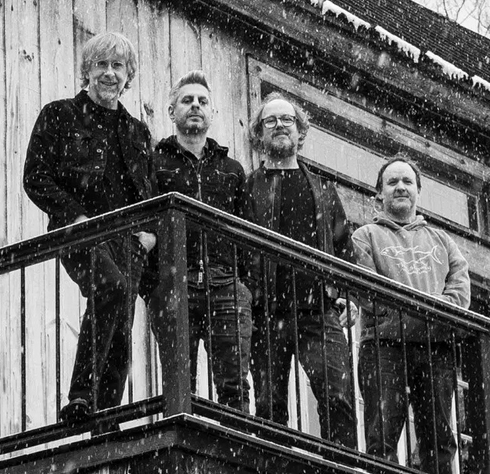Phish: Sigma Oasis

While it will take time to known if it is truly timeless, Sigma Oasis will always evoke a specific moment. Less than 24 hours after announcing the surprise release of their 15th album, in the midst of the novel coronavirus crisis, the band held a virtual “listening party,” in which fans were able to all tune in simultaneously as they streamed the album across radio and social media platforms. For 66 minutes on an otherwise grim and weird Wednesday evening in April, during a bizarre period of forced individual isolation, every Phish fan in the country felt connected. It was a moment of unity that, for Phish fans, was the subcultural equivalent of Live Aid or Hands Across America.
At times, Sigma Oasis almost feels more like unearthed concert recordings than a new studio album. Sure, it benefits from fancy flourishes (strings and backing vocals are laced tastefully throughout) and overdubs (such as keyboardist Page McConnell’s Vida Blue-like gadgetry), but the quartet recorded the basic tracks live, in their comfortable Vermont barn headquarters, where they were able to improvise while making eye-contact—they were jamming, sans audience. The live vibe shines as they confidently work their way through the cream of their cache, taking songs like underplayed favorites “Leaves” and “Thread,” and giving them new life on Sigma Oasis.
In recent years, Phish have sounded like they were reaching for something that wasn’t quite there in the studio, trying to be some band that wasn’t quite them. On Sigma Oasis, Phish sounds like Phish—even in the studio, for the first time since 2002’s Round Room (which was also, not coincidentally, recorded live in their studio lair, The Barn).
Previous Phish sometimes suffered from prestigious outside producers that didn’t have a fan’s ear, and the results—from sterilization to the track lists—betrayed that. Here, all nine songs read like the setlist to a perfect set of live Phish. The band co-produced the album with Vance Powell, whose own roots lie in the live-sound world. Artists sometimes refer to albums as photographs from a certain time and place, but this isn’t a photograph—it’s a goddamn calling card.
By just the third song in, “Everything’s Right,” the band turns the jam knob to 11, stretching out the song for 12 minutes, and eventually landing in “Type II” territory. Jambands almost always approach studio versions as a way of establishing a base model, but the studio version of “Everything’s Right”—and “Thread,” the album’s grand finale—ends up deviating from the standard even more than some live versions, including vocal flairs that give this permanent on-the-record version a whimsical feel that isn’t usually heard in the studio.
Phish’s balladry is also highlighted with augmented versions of “Shade” and the “Life Beyond a Dream,” a crossover from Trey Anastasio’s Ghost of the Forest tour, while the cautionary tale of “Evening Song” earns its keep in between two oft-requested multi-beast fan favorites, “Mercury” and “Steam.”
Lyrically, Sigma Oasis bridges the gap between lyricist Tom Marshall’s brilliant Rift-era poeticism and Anastasio’s message-driven content that’s become such a hallmark of his current songwriting. (This is also Phish’s first album since Farmhouse, 20 years ago, to only feature material penned by Anastasio and his writing partners.)
In spite of enormous odds, this studio album by a band who isn’t particularly known for their studio albums is able to harness the healing power of music to deliver relief and panacea during a stressful global pandemic, and it continues to unite a community that is physically separated by social distancing and government orders. Benjy Eisen




















